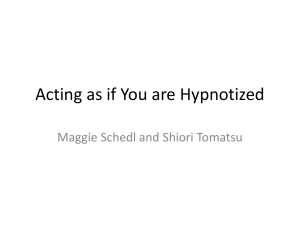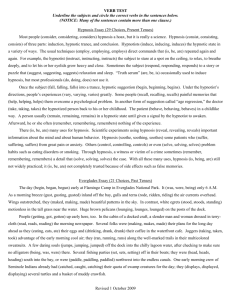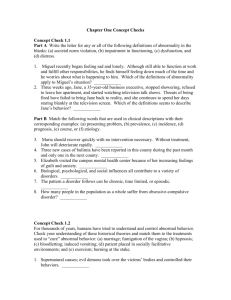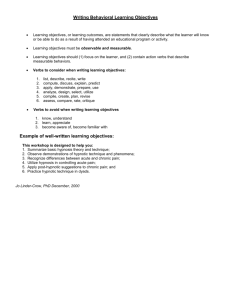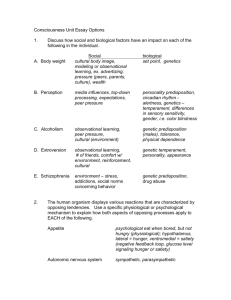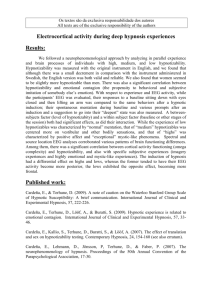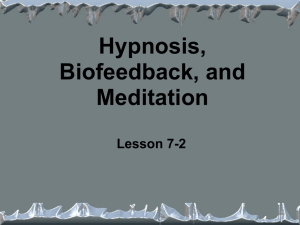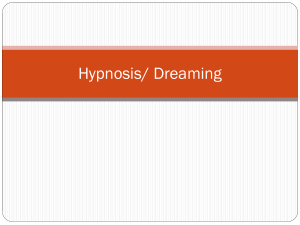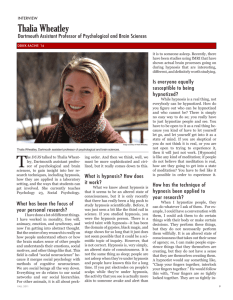DISASTER RESOURCE
advertisement
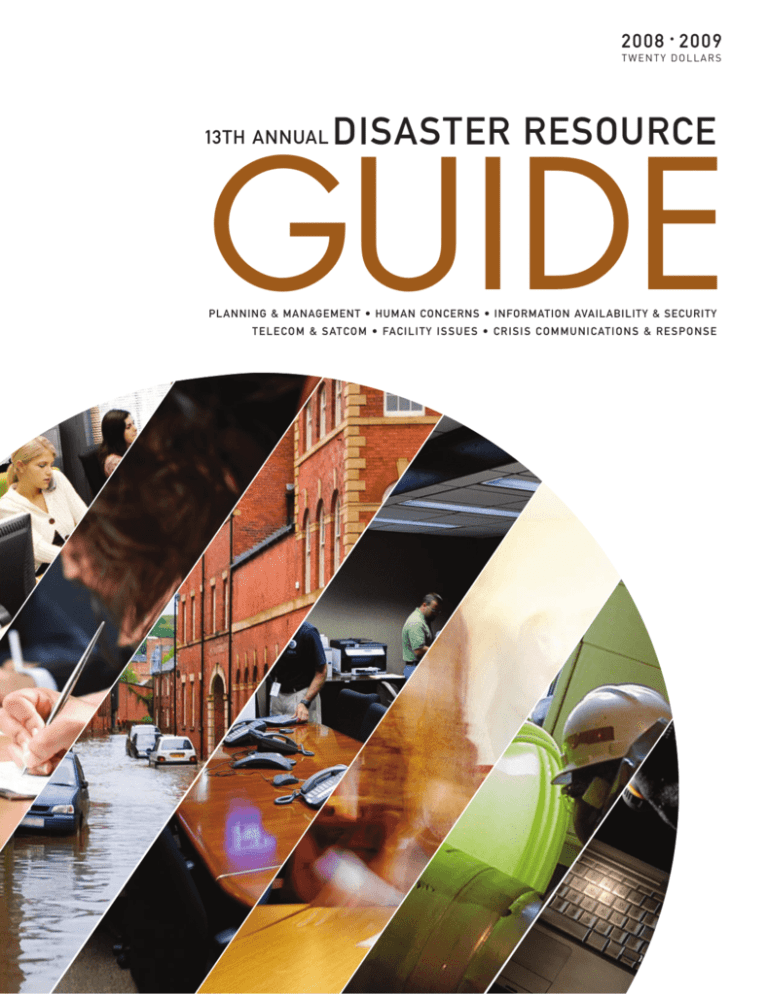
2008 • 2009 Twenty DOLLARS GUIDE 13TH ANNUAL DISASTER RESOURCE PLANNING & MANAGEMENT • HUMAN CONCERNS • INFORMATION availability & Security T elecom & S atcom • FAC I L I T Y I S S U E S • C R I S I S C O M M U N I C AT I O N S & R E S P O N S E Huma n C o n ce r n s The Potential for Utilizing Hypnosis and Hypnotherapy in Crisis Intervention and Event Recovery B y Dr . S t e v e T i mm o n s 78 DISASTER RESOURCE G UIDE 2 0 0 8 / 2 0 0 9 Let’s play word association. Hypnosis! Quick…what comes to mind? A comedy club with 20 or so halfsober people on stage responding to off-color hypnotic suggestions? A county fair where the hypnotist has someone barking like a dog and chasing a stick around the platform? Maybe a scary movie where the bad guy’s eyes glow white as he commands his victim to carry out some heinous crime? Not surprisingly, this pretty well sums up the general public’s perception about hypnosis and hypnotherapy. And what a shame, really…because it can be one of the most rapid and effective modalities available for dealing with psychological, medical, performance, and creative challenges. Many doctors today, both medical and psychological, are either performing hypnosis themselves or referring their patients to hypnotherapists. Up front, let’s make it clear that this article is not recommending replacing traditional modalities for providing mental and emotional support of people in crisis…such as EAP, counseling, or psychotherapy. Instead, let’s consider the potential benefits of adding another “arrow in the quiver” when it comes to helping our corporate families to deal quickly and effectively with severe crisis events. Part One: Understanding the Modality of Hypnosis and Hypnotherapy Before we take a moment and consider the possible uses of hypnosis in crisis intervention and event recovery, let’s get on the same page about what hypnosis is NOT: 1. Hypnosis is NOT related to anything “mystical” or “occult” – it is a very natu- ral state that most of us pass in and out of every day. Have you ever been daydreaming while driving and missed your exit? Have you ever been so engrossed in a movie or TV show that you didn’t hear someone speaking to you even though they were sitting right beside you? Can you remember how much less it hurt after Mom offered to “kiss your booboo and make it all better”? You’ve likely experienced a “trance state”, actually a light state of hypnosis. 2. Hypnosis is NOT mind control – a hypnotist cannot control your mind, or make you do anything you don’t want to do. ANY suggestion that is against your moral or ethical standards would simply be rejected by your subconscious. Also, although you may be very focused in a state of hypnosis, you are actually more aware and alert than most “normal” mental states. The bottom line is that no one can hypnotize you EXCEPT you…the only true form of hypnosis is self-hypnosis. A good hypnotist or hypnotherapist is simply a guide that will lead you through the process. Hypnosis is not for everyone, just as no single treatment option for any condition will work on everyone. Some people find it very easy to enter a hypnotic (trance) state, and some find it very difficult. If we look at it from a foundational level, hypnosis involves: •Bypassing the critical faculty (the conscious analytical thought processes) of your mind…this allows your subconscious mind to play a dominant role, and •Reaching a state of “heightened focus and suggestibility” This combination of factors can allow the subconscious mind to be “reprogrammed” with more positive neuro-associations. We’ll discuss this in more detail below. In summarizing this introduction, don’t allow common misperceptions to taint your view of what can be a tremendous crisis recovery tool. For a more comprehensive overview of hypnosis and hypnotherapy, there are many good books and infor- mation available in print. (Check out writings and teachings by Gil Boyne, Dave Elman, Milton Erickson, and Don Mottin…just to name a few.) This will provide a more substantive overview of the therapeutic and non-therapeutic uses of this powerful modality. Also, check out the sidebar in this article with contact information for two of the largest established and reputable certification organizations for hypnosis practitioners. They can assist you in finding certified and reputable practitioners in your area. Be aware: Legislation regulating hypnosis varies greatly from state-to-state and country-to-country. And many people who are legally allowed to practice hypnosis (because of their profession) may never have received any actual training in how to perform hypnosis. Some level of research should be anticipated to locate experienced hypnotists / hypnotherapists that can truly support your organization in crisis. Part Two: A Use for Hypnosis in Severe Crisis Events Well, if you’re still reading it probably means you’ve bought into the idea that hypnosis might be good for something more than cheap entertainment or to satisfy the nagging spouse that wants you to stop smoking! So let’s discuss the seemingly strange relationship between hypnosis / hypnotherapy and an organization in crisis… In simple terms, a neuro-association is the link in a person’s subconscious mind between a sensory stimulus and A hypnotist cannot control your mind, or make you do anything you don’t want to do. a strong emotion. Here’s an example: you’ve just made your first skydive, and while you were in the air you had your iPod cranking out “Born to be Wild” by Steppenwolf. This skydive has created a strong emotional state continued on page 80 www.disaster-resource.com 79 Huma n C o n ce r n s continued from page 79 To locate certified hypnosis practitioners in your area, we suggest the following organizations: American Council of Hypnotist Examiners National Guild of Hypnotists 700 South Central Avenue PO Box 308 Glendale, CA 91204 Merrimack, NH 03054 hypnotismla@earthlink.net ngh@ngh.net www.hypnotistexaminers.org www.ngh.net of exhilaration and excitement (maybe mixed with a touch of fear!) and likely released a good dose of endorphins and enkephalins into your brain. The song you’ve been listening to during this time has created a neuro-association (a link) between the song (sensory stimulus) and the experienced emotional state. Now, the next time you’re driving in your car and “Born to be Wild” comes on the radio, you’re going to experience some degree of that emotional state all over again. The song becomes a “trigger” to that emotional state in your subconscious mind. Unfortunately, negative neuro-associations are created exactly the same way. Imagine you’ve just witnessed the first plane hitting the World Trade Center on 9/11 (from the street or from your office window). Suppose you’re a pilot and the realization that it could have happened to your flight becomes all too clear. What if you’re eating shrimp creole at home, or were sitting in a certain restaurant when you heard the news. It’s very possible now that you’ll find it difficult or painful to even think about walking back down that street, going back to your office, getting back on a plane, or eating that specific food. This is because your subconscious mind now holds a very negative neuro-association between the emotions of the event and the sensory stimulus you were experiencing when it happened. 80 DISASTER RESOURCE G UIDE 2 0 0 8 / 2 0 0 9 Can we help the members of our corporate family emotionally and mentally impacted by such an event? Can we protect them and help them return to a state of normalcy as quickly as possible? Of course the established options of counseling or extended psychotherapy are available. But in my personal experience doing global consulting work in crisis psychology and human impact planning / recovery, as a certified professional in hypnosis, hypnotherapy, and forensic hypnosis, and as an avid practitioner of self-hypnosis…I have discovered nothing more effective in rapidly reframing the negative neuroassociations of a traumatic event than hypnosis. Many times, subconscious neuro-associations are unknown by the person in trauma and may take a long time to surface. Does the possibility of addressing an issue in a few (or even one) session of hypnosis vs. extended counseling or psychotherapy hold appeal in supporting a rapid return to normal operations? Again, a disclaimer that hypnosis / hypnotherapy is not a silver bullet…nor is it the right modality for everyone. But as your organization does proactive preparation in the area of supporting people through (and helping them recover from) a crisis event, might it possibly be of value to have this alternative pre-approved and available to your workforce? This article doesn’t allow us time to explore the techniques that a certi- fied practitioner might employ, but let’s quickly discuss what the goal of the modality would be in this specific instance. In reframing a negative neuroassociation, creating amnesia should never be the agreed-upon approach… blocking out an event is probably not the best way to deal with the trauma. Instead, the goal of the session should be to disconnect the negative emotions from the sensory stimulus…in other words, the “trigger” would no longer launch the emotional state. This means the person being helped would certainly remember that the event took place, but it would no longer create the same intense negative emotions or fears that it had in the past. The person could now return to the office, get back on a plane, eat their favorite Cajun food, or return to the same restaurant without experiencing the negative emotions that had been triggered within their subconscious mind. Closing Thoughts The most common point of failure in a severe crisis event is…and will likely always be…people. Thinking outside the “proverbial box” has its costs and its benefits, and they both must be weighed. Please consider this as a final thought: the more effectively you can support your people in a crisis event, the more effectively they can support the organization and allow a rapid return to normal operations. And isn’t that the bottom line we’re all working to achieve? About the Author Steve Timmons, PhD SPHR CBCP is a Principal with Solutions for Organizational Survival based out of Atlanta, Georgia. He holds doctorates in Psychology and Management, and professional recognition as a Certified Hypnotherapist by the National Guild of Hypnotists and Clinical Hypnotherapist by the American Council of Hypnotist Examiners. Steve’s specialization in the field of hypnosis is Forensic Hypnosis. He is active on a global basis in crisis consulting and can be reached by emailing steve@organizationalsurvival.com
